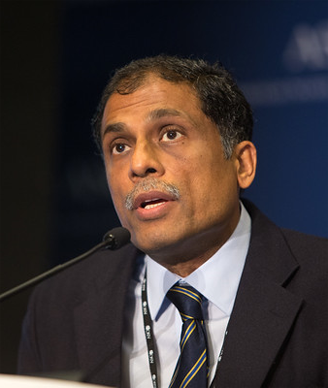Elective Dissection of Lymph Nodes Improves Survival in Early Oral Cancer
Elective neck lymph node surgery for patients with early oral cancer reduces the risk of cancer recurrence and improves survival.
Anil D’Cruz, MBBS, MS, FRCS, presenting results of the trial. Photo © ASCO / Scott Morgan 2015.

Elective neck lymph node surgery for patients with early oral cancer reduces the risk of cancer recurrence and improves survival, according to a prospective, randomized phase III study presented at the 2015 American Society of Clinical Oncology (ASCO) Annual Meeting, held May 29 to June 2, in Chicago.
“Elective neck dissection should be the standard of care for early oral node-negative squamous cell cancers based on the findings of our trial,” lead author Anil D’Cruz, MBBS, MS, FRCS, professor and chief, department of head and neck surgery at Tata Memorial Centre in Mumbai, India, told a plenary session (abstract LBA3). “For every eight patients who undergo elective neck dissection, one death is prevented. For every four patients who undergo elective neck dissection, one recurrence is prevented.”
With no strong clinical practice recommendations advocating neck dissection with early oral cancers to date, there has been gross variability in practice around the world. The trial showed that a preventive approach both improves survival and lowers recurrence rates compared with therapeutic neck dissection performed at the time of nodal occurrence.
“Contrary to popular belief, oral cancer affects patients in developed and developing countries,” said D’Cruz. “It is seen anywhere there is a high incidence of consumption of tobacco and alcohol.”
Early oral cancer is often cured with surgical removal of the tumor, but it can recur and spread to lymph nodes in the neck. A “watch-and-wait” approach that leads to therapeutic neck dissection has “no conclusive evidence of survival disadvantage,” he said. This approach often leads to additional surgical procedures with associated morbidities and shoulder dysfunction. “Elective neck dissection leads to better control and survival and is a single-stage procedure,” D’Cruz said.
In this trial, conducted at Tata Memorial Centre between 2004 and 2014, 596 patients with T1 or T2 squamous carcinoma of the oral cavity were randomly assigned to elective neck dissection or therapeutic neck dissection. D’Cruz reported on an interim analysis of the first 500 patients with a minimum of 9 months follow-up.
The 3-year overall survival in patients who opted for surgery was 80% compared with 67.5% for those treated with a “watch-and-wait” approach (hazard ratio [HR] = 0.63, 95% CI, 0.44–0.89, P = .01). Elective neck dissection also resulted in a 23.6% absolute increase in 3-year disease-free survival (69.5% vs 45.9%; HR = 0.44, 95% CI, 0.34–0.58, P < .001).
“This robust study that affects 300,000 patients worldwide is the first to conclusively prove that more lives can be saved with elective neck dissection. This answers a question doctors have been asking for over 50 years,” D’Cruz said. “Armed with the results of this study, doctors will be able to confidently counsel patients that adding neck surgery to their initial treatment is worthwhile.”
Jyoti D. Patel, MD, associate professor in medicine-hematology/oncology at Northwestern University Feinberg School of Medicine, commented: “This study provides long-awaited answers to a question doctors worldwide have struggled with. We never want to do more surgery than we have to, but for patients with early oral cancer, we now know that more extensive surgery prolongs lives.”